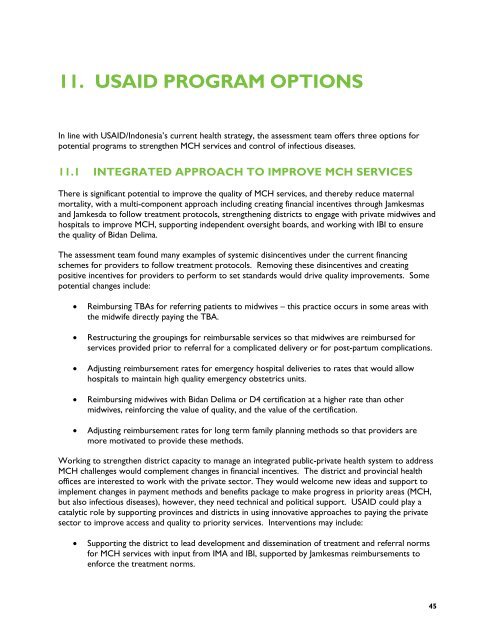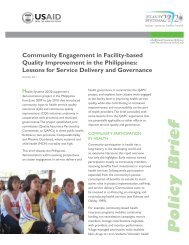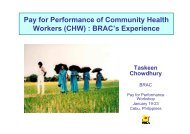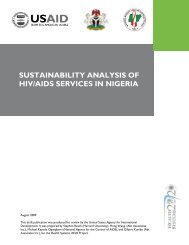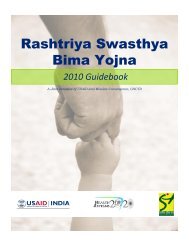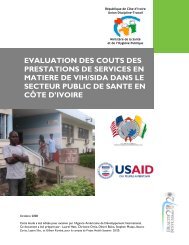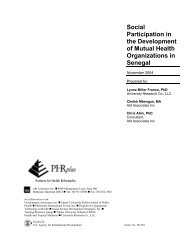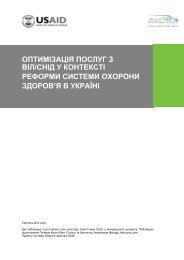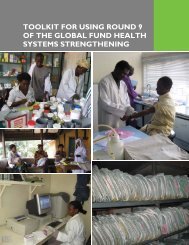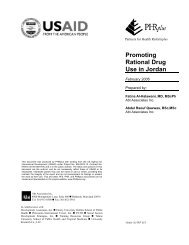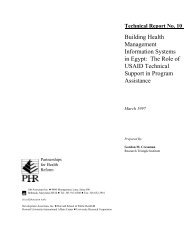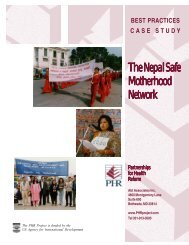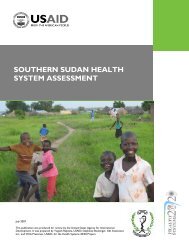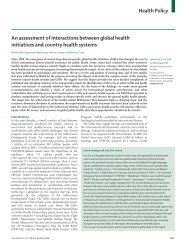PRIVATE SECTOR HEALTH CARE IN INDONESIA - Health Systems ...
PRIVATE SECTOR HEALTH CARE IN INDONESIA - Health Systems ...
PRIVATE SECTOR HEALTH CARE IN INDONESIA - Health Systems ...
- No tags were found...
Create successful ePaper yourself
Turn your PDF publications into a flip-book with our unique Google optimized e-Paper software.
11. USAID PROGRAM OPTIONSIn line with USAID/Indonesia’s current health strategy, the assessment team offers three options forpotential programs to strengthen MCH services and control of infectious diseases.11.1 <strong>IN</strong>TEGRATED APPROACH TO IMPROVE MCH SERVICESThere is significant potential to improve the quality of MCH services, and thereby reduce maternalmortality, with a multi-component approach including creating financial incentives through Jamkesmasand Jamkesda to follow treatment protocols, strengthening districts to engage with private midwives andhospitals to improve MCH, supporting independent oversight boards, and working with IBI to ensurethe quality of Bidan Delima.The assessment team found many examples of systemic disincentives under the current financingschemes for providers to follow treatment protocols. Removing these disincentives and creatingpositive incentives for providers to perform to set standards would drive quality improvements. Somepotential changes include:• Reimbursing TBAs for referring patients to midwives – this practice occurs in some areas withthe midwife directly paying the TBA.• Restructuring the groupings for reimbursable services so that midwives are reimbursed forservices provided prior to referral for a complicated delivery or for post-partum complications.• Adjusting reimbursement rates for emergency hospital deliveries to rates that would allowhospitals to maintain high quality emergency obstetrics units.• Reimbursing midwives with Bidan Delima or D4 certification at a higher rate than othermidwives, reinforcing the value of quality, and the value of the certification.• Adjusting reimbursement rates for long term family planning methods so that providers aremore motivated to provide these methods.Working to strengthen district capacity to manage an integrated public-private health system to addressMCH challenges would complement changes in financial incentives. The district and provincial healthoffices are interested to work with the private sector. They would welcome new ideas and support toimplement changes in payment methods and benefits package to make progress in priority areas (MCH,but also infectious diseases), however, they need technical and political support. USAID could play acatalytic role by supporting provinces and districts in using innovative approaches to paying the privatesector to improve access and quality to priority services. Interventions may include:• Supporting the district to lead development and dissemination of treatment and referral normsfor MCH services with input from IMA and IBI, supported by Jamkesmas reimbursements toenforce the treatment norms.45


